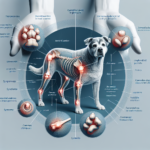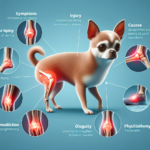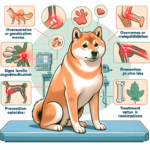Boerboel Joint Pain: Causes, Symptoms, Prevention, and Treatment
Introduction
The Boerboel, also known as the South African Mastiff, is a large, powerful breed originally developed in South Africa for the purpose of guarding homesteads and farms. Known for their strength, loyalty, and protective nature, Boerboels are highly valued as both working dogs and family companions. Their history dates back to the 17th century when Dutch settlers brought large, strong dogs to South Africa, which were then bred with local breeds to create the Boerboel. This breed is characterized by its muscular build, broad head, and confident demeanor.
Like many large breeds, Boerboels are prone to certain health issues, with joint pain being a significant concern. Joint health is crucial for Boerboels due to their size and the physical demands placed on them. Ensuring good joint health can help maintain their quality of life and prolong their active years.
Breed-Specific Joint Pain Risks
Genetic Predisposition
Boerboels are genetically predisposed to several joint-related issues, including hip dysplasia, elbow dysplasia, and arthritis. Hip dysplasia is a condition where the hip joint does not fit properly into the hip socket, leading to pain and mobility issues. Elbow dysplasia involves abnormal development of the elbow joint, causing lameness and discomfort. Arthritis, a degenerative joint disease, can also affect Boerboels, leading to chronic pain and stiffness.
Age-Related Risks
As Boerboels age, the risk of joint pain increases. While young Boerboels may show signs of joint issues due to genetic factors, older dogs are more likely to develop arthritis and other degenerative joint conditions. Owners should be particularly vigilant as their Boerboel approaches middle age, typically around 5-7 years, as this is when joint problems often become more apparent.
Activity Level and Joint Stress
Boerboels are active and energetic dogs that require regular exercise to stay healthy. However, their large size and high activity level can put significant stress on their joints. Activities such as running, jumping, and playing can exacerbate joint issues, especially if the dog is not properly conditioned or if the activities are too strenuous. It’s important to balance exercise with rest and to avoid activities that may cause excessive joint strain.
Common Symptoms of Joint Pain in Boerboels
General Symptoms
- Limping or favoring one leg
- Stiffness, especially after rest or exercise
- Reluctance to move, jump, or climb stairs
- Swelling around the joints
- Decreased activity or playfulness
- Whining or showing signs of discomfort when touched
Breed-Specific Symptoms
In Boerboels, joint pain may manifest more prominently due to their size and weight. Owners may notice a pronounced limp or difficulty in getting up from a lying position. Additionally, Boerboels may become more irritable or less tolerant of physical activity, which can be a sign of underlying joint pain.
When to Consult a Vet
If you observe any of the above symptoms in your Boerboel, it’s important to consult a veterinarian. Early diagnosis and treatment can help manage joint pain and prevent further deterioration. Seek veterinary advice if your dog shows persistent signs of discomfort, has difficulty moving, or if you notice any swelling or changes in behavior.
Preventive Measures for Joint Health
Exercise Recommendations
Regular, moderate exercise is essential for maintaining joint health in Boerboels. Activities such as walking, swimming, and controlled play can help keep their joints flexible and muscles strong. Avoid high-impact activities like jumping or running on hard surfaces, as these can exacerbate joint issues. Instead, focus on low-impact exercises that provide a good workout without putting excessive strain on the joints.
Dietary Suggestions
A balanced diet rich in essential nutrients can support joint health in Boerboels. Look for dog foods that contain glucosamine and chondroitin, which are known to promote joint health. Omega-3 fatty acids, found in fish oil supplements, can also help reduce inflammation and support joint function. Consult your veterinarian for specific dietary recommendations tailored to your dog’s needs.
Weight Management
Maintaining a healthy weight is crucial for reducing joint stress in Boerboels. Excess weight can put additional pressure on the joints, leading to pain and mobility issues. Monitor your dog’s weight regularly and adjust their diet and exercise routine as needed to keep them at an optimal weight. Your veterinarian can provide guidance on the appropriate weight range for your Boerboel.
Early Screening and Monitoring
Regular veterinary check-ups and early screening for joint issues can help catch problems before they become severe. X-rays and other diagnostic tests can identify joint abnormalities early on, allowing for timely intervention. Discuss with your veterinarian about breed-specific screening tests and monitoring strategies to ensure your Boerboel’s joint health is closely monitored.
Treatment Options for Joint Pain
Non-Surgical Treatments
Non-surgical treatments for joint pain in Boerboels include medications, physical therapy, and lifestyle adjustments. Anti-inflammatory drugs and pain relievers can help manage pain and reduce inflammation. Physical therapy, including exercises and massage, can improve joint mobility and strengthen muscles. Lifestyle adjustments, such as providing a comfortable bed and avoiding strenuous activities, can also help alleviate joint pain.
Surgical Options
In severe cases of joint pain, surgical intervention may be necessary. Common surgical options for Boerboels include hip replacement, elbow surgery, and arthroscopy. These procedures can help restore joint function and reduce pain. Your veterinarian will discuss the best surgical options based on your dog’s specific condition and overall health.
Alternative Therapies
Alternative treatments such as acupuncture, hydrotherapy, and massage can provide additional relief for Boerboels with joint pain. Acupuncture involves inserting thin needles into specific points on the body to relieve pain and improve function. Hydrotherapy, or water therapy, allows dogs to exercise in water, reducing joint stress while providing a good workout. Massage can help relax muscles and improve circulation, promoting joint health.
Lifestyle and Management Tips
Daily Care Routine
A consistent daily care routine can help manage and alleviate joint pain in Boerboels. This routine may include gentle exercise, a balanced diet, and regular veterinary check-ups. Providing a comfortable sleeping area with an orthopedic bed can also help reduce joint stress.
Modifying the Home Environment
Making adjustments to your home environment can make it more comfortable for a Boerboel suffering from joint pain. Consider installing ramps to help your dog navigate stairs or get into the car. Provide non-slip flooring to prevent falls and ensure your dog has easy access to their food, water, and resting areas.
Long-Term Management
Long-term management of joint pain involves ongoing care and monitoring. Regular veterinary visits, a consistent exercise routine, and a balanced diet are essential. Additionally, consider incorporating joint supplements and alternative therapies into your dog’s care plan to support their joint health over the long term.
FAQs About Boerboels and Joint Pain
What are the early signs of joint pain in Boerboels?
Early signs of joint pain in Boerboels include limping, stiffness, reluctance to move, and decreased activity. If you notice any of these symptoms, consult your veterinarian for a thorough evaluation.
Can joint pain in Boerboels be prevented?
While genetic factors cannot be changed, joint pain in Boerboels can be managed and minimized through proper exercise, a balanced diet, weight management, and regular veterinary check-ups. Early screening and intervention can also help prevent severe joint issues.
Are there specific exercises that are better for Boerboels with joint pain?
Low-impact exercises such as walking, swimming, and controlled play are ideal for Boerboels with joint pain. These activities help maintain joint flexibility and muscle strength without putting excessive strain on the joints.
What dietary supplements can help with joint health in Boerboels?
Supplements containing glucosamine, chondroitin, and omega-3 fatty acids can support joint health in Boerboels. Consult your veterinarian for specific recommendations based on your dog’s needs.
When should I consider surgery for my Boerboel’s joint pain?
Surgery may be considered if non-surgical treatments are not effective and your dog is experiencing severe pain and mobility issues. Your veterinarian will discuss the best surgical options based on your dog’s condition and overall health.
Conclusion
Joint pain is a common concern for Boerboels, but with proper care and management, it can be effectively managed. By understanding the breed-specific risks, recognizing early symptoms, and taking preventive measures, owners can help ensure their Boerboel’s joint health and overall well-being. Regular veterinary check-ups, a balanced diet, appropriate exercise, and weight management are key components of maintaining joint health. If joint pain does occur, a combination of non-surgical treatments, surgical options, and alternative therapies can provide relief and improve quality of life. By staying proactive and informed, you can help your Boerboel lead a happy, active life despite joint pain.




